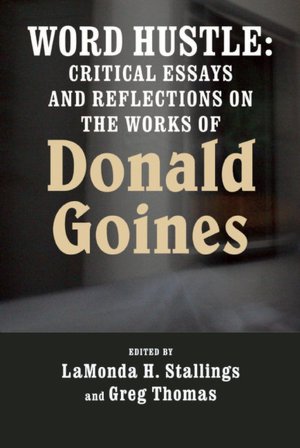This content is being reviewed in light of recent changes to federal guidance.
Condemnation & Redemption: The Works of Donald Goines
 Addison Gayle, Jr. was not a signifying monkey. Many contemporary scholars and critics ignore his existence; they dismiss his insights as strident sub-literary talk, noise not to invite to dinner at the Academic Big House. A few critics of my generation refuse to erase him. We do not embrace Gayle’s views without question. We do, however, respect the historical importance and contemporary relevance of his thought. We find his exploration of fiction in The Way of the New World: The Black Novel in America (1975) to be bracing. We find useful insights in the essays he collected in The Black Situation (1970), and one of those essays “Revolutionary Philosophy” seems poignant in the midst of debates about the status of the gun in the United States. Rereading that essay casts light on issues explored in Word Hustle.
Addison Gayle, Jr. was not a signifying monkey. Many contemporary scholars and critics ignore his existence; they dismiss his insights as strident sub-literary talk, noise not to invite to dinner at the Academic Big House. A few critics of my generation refuse to erase him. We do not embrace Gayle’s views without question. We do, however, respect the historical importance and contemporary relevance of his thought. We find his exploration of fiction in The Way of the New World: The Black Novel in America (1975) to be bracing. We find useful insights in the essays he collected in The Black Situation (1970), and one of those essays “Revolutionary Philosophy” seems poignant in the midst of debates about the status of the gun in the United States. Rereading that essay casts light on issues explored in Word Hustle.
In the introduction to commentary on the works of Donald Goines, L. H. Stalling notes that Gayle acknowledged neither the existence of street literature nor “its importance to a Black Arts or Black Power Movement” (21). Nevertheless, Dennis Chester’s essay on Goines’ Daddy Cool (1974) recognizes the importance of contrasting Gayle’s quest for freedom, justice, and the creation of a new society with Goines’ s depiction of a new society which is deeply flawed and “whose fundamental principles are contradictory” (100-101). Chester and other contributors to Word Hustle realize that critiques of street literature are necessary to continue the unfinished projects of the Black Arts/Black Aesthetic cultural phenomenon. As Candice Love Jackson argues in “The Paradox of Empowerment: Colonialism, Community, and Criminality in Donald Goines’s Kenyatta Series” (33-48), Goines’s works urge readers “to navigate new articulations of Black consciousness cautiously and soberly” (47). The overseers of American literary acceptability miss a lot by trying to confine Goines to the outer reaches of the canonized plantation. Bourgeois dismissal of Gayle as a critic and of Goines as a novelist only increases one’s appetite for a literary historical epiphany.
In one moment of reading Word Hustle, I imagined condemnation should be “con/damnation” and redemption should become “re/deepenation.” Such linguistic sport can engender its own kind of hustle, a hustle to expose how the cunning of ex-cons who write novels (prison novels in particular) can advance dread-filled “truths” about the power of language much better than do many post-whatever novelists. The sport can affirm hip-hop deconstruction of revolutionary dreams in fiction and become a timely enterprise for literary and cultural criticism. Word Hustle warrants our engaging the counter-canon of American literature, the unsaintly works that boldly address certain realities of intraracial caste and class, of race-riddled sexism and homophobia, of confused descriptions of American masculinity, power and hegemony, and reform/revolutionary acts. Like their elite and proletarian cousins, Goines’s novels do employ traditional narrative strategies, and they do belong “in non-Hegelian conversation” with criminalization and mass incarceration schemes, aesthetic smokescreens, subliminal concerns regarding praxis, economics, labor, and with the trauma of genuine historical consciousness that orthodox humanities, print or digital, desperately wish to conceal.
Literature is not salvific. As Addison Gayle reminded us in “Revolutionary Philosophy,” some of us “dreamed not of integration but nationalism, not of a melting pot theory but of a pluralistic theory, not of a great society but a new one. More important, we dreamed of fashioning Canaan out of the debris of American society, of erecting a nation predicated not upon the gun but upon morality, and if these dreams are hopeless, then so too is the future of mankind” (221). Literature can’t save us if we are determined like terrorists to destroy ourselves and everyone else. But “in conversation,” Gayle and Goines promote recognition that the twenty-first- century world order is gangsta and ratchet. For a nice contextualization of “ratchet,” read Imani Perry’s “Of Degraded Talk, Digital Tongues, and A Commitment to Care,” Profession (2012): 17-24
Stallings, L. H. and Greg Thomas, eds. Word Hustle: Critical Essays and Reflections on the Works of Donald Goines. Baltimore: IMPRINT EDITIONS, 2011.